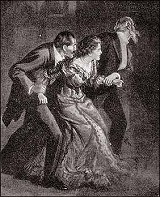
“But everything went wrong with us. In some way I had excited the suspicion of Lopez, the secretary. He crept up behind me and sprang upon me just as I had finished the note. He and his master dragged me to my room and held judgment upon me as a convicted traitress. Then and there they would have plunged their knives into me could they have seen how to escape the consequences of the deed. Finally, after much debate, they concluded that my murder was too dangerous. But they determined to get rid forever of Garcia. They had gagged me, and Murillo twisted my arm round until I gave him the address. I swear that he might have twisted it off had I understood what it would mean to Garcia. Lopez addressed the note which I had written, sealed it with his sleeve-link, and sent it by the hand of the servant, Jose. How they murdered him I do not know, save that it was Murillo’s hand who struck him down, for Lopez had remained to guard me. I believe he must have waited among the gorse bushes through which the path winds and struck him down as he passed. At first they were of a mind to let him enter the house and to kill him as a detected burglar; but they argued that if they were mixed up in an inquiry their own identity would at once be publicly disclosed and they would be open to further attacks. With the death of Garcia, the pursuit might cease, since such a death might frighten others from the task.
“All would now have been well for them had it not been for my knowledge of what they had done. I have no doubt that there were times when my life hung in the balance. I was confined to my room, terrorized by the most horrible threats, cruelly ill-used to break my spirit - see this stab on my shoulder and the bruises from end to end of my arms - and a gag was thrust into my mouth on the one occasion when I tried to call from the window. For five days this cruel imprisonment continued, with hardly enough food to hold body and soul together. This afternoon a good lunch was brought me, but the moment after I took it I knew that I had been drugged. In a sort of dream I remember being half-led, half-carried to the carriage; in the same state I was conveyed to the train. Only then, when the wheels were almost moving, did I suddenly realize that my liberty lay in my own hands. I sprang out, they tried to drag me back, and had it not been for the help of this good man, who led me to the cab, I should never have broken away. Now, thank God, I am beyond their power forever.”
We had all listened intently to this remarkable statement. It was Holmes who broke the silence.
“Our difficulties are not over,” he remarked, shaking his head. “Our police work ends, but our legal work begins.”
“Exactly,” said I. “A plausible lawyer could make it out as an act of self-defence. There may be a hundred crimes in the background, but it is only on this one that they can be tried.”
“Come, come,” said Baynes cheerily, “I think better of the law than that. Self-defence is one thing. To entice a man in cold blood with the object of murdering him is another, whatever danger you may fear from him. No, no, we shall all be justified when we see the tenants of High Gable at the next Guildford Assizes.”